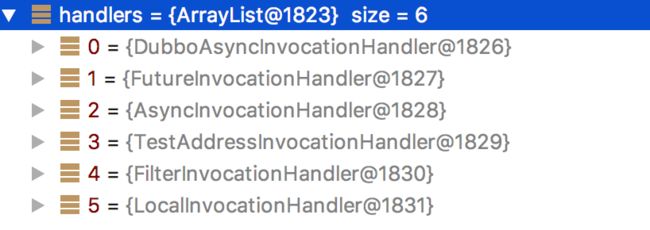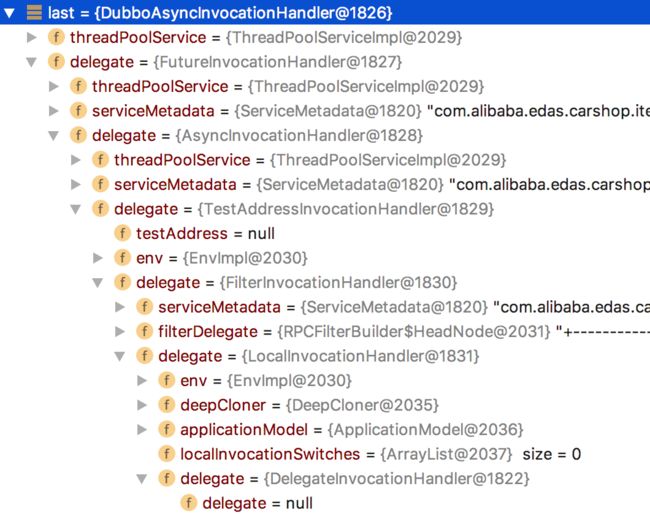InvocationHandler使用责任链的方式来调用,总体思路就是一(出口)带多(拦截器)
1.InvocationHandlerChainFactory
InvocationHandlerChainFactory用于构建InvocationHandler链路
public interface InvocationHandlerInterceptor extends InvocationHandler {
void setInvocationHandler(InvocationHandler var1);
}
public class InvocationHandlerChainFactory {
public InvocationHandlerChainFactory() {
}
public static InvocationHandler buildHandlerChain(ServiceMetadata metadata, InvocationHandler invocationHandler) {
List handlers;
if (metadata.isProvider()) {
handlers = HSFServiceContainer.getInstances(InvocationHandlerInterceptor.class, new String[]{"server"});
} else {
handlers = HSFServiceContainer.getInstances(InvocationHandlerInterceptor.class, new String[]{"client"});
}
InvocationHandler last = invocationHandler;
for(int i = handlers.size() - 1; i >= 0; --i) {
InvocationHandlerInterceptor handler = (InvocationHandlerInterceptor)handlers.get(i);
handler.setInvocationHandler((InvocationHandler)last);
if (handler instanceof ServiceMetadataAware) {
((ServiceMetadataAware)handler).setServiceMetadata(metadata);
}
if (handler instanceof LifeCycle) {
((LifeCycle)handler).start();
}
last = handler;
}
return (InvocationHandler)last;
}
}
以Consumer为例,获取到6个InvocationHandler
转换成责任链模式
2.InvocationHandler
2.1 DubboAsyncInvocationHandler
根据InvokeMode类型执行,这里是同步则直接掉到下个InvocationHandler
public ListenableFuture invoke(Invocation invocation) throws Throwable {
InvokeMode invokeType = invocation.getInvokeType();
ListenableFuture rpcFuture;
if (InvokeMode.FUTURE == invokeType) {
rpcFuture = this.delegate.invoke(invocation);
this.futureInvoke(invocation, rpcFuture);
} else if (InvokeMode.CALLBACK == invokeType) {
rpcFuture = callbackInvoke(invocation, this.delegate, this.threadPoolService.callbackExecutor());
} else {
rpcFuture = this.delegate.invoke(invocation);
}
return rpcFuture;
}
2.2 FutureInvocationHandler
将UserThreadPreferedExecutor设置为Invocation的executor属性
public ListenableFuture invoke(Invocation invocation) throws Throwable {
InvokeMode invokeType = invocation.getInvokeType();
if (InvokeMode.SYNC == invokeType) {
UserThreadPreferedExecutor userThreadPreferedExecutor = new UserThreadPreferedExecutor(this.threadPoolService.internalCallbackExecutor());
invocation.setExecutor(userThreadPreferedExecutor);
ListenableFuture rpcFuture = this.delegate.invoke(invocation);
ListenableFuture rpcFuture = new UserThreadPreferedListenableFuture(userThreadPreferedExecutor, rpcFuture);
return rpcFuture;
} else if (InvokeMode.NEW_FUTURE == invokeType) {
Executor futureListenerExecutor = FutureInvocationHelper.futureListenerExecutor;
if (futureListenerExecutor == null) {
futureListenerExecutor = this.threadPoolService.getExecutorManager().getDefaultExecutor();
}
UserThreadPreferedExecutor userThreadPreferedExecutor = new UserThreadPreferedExecutor((Executor)futureListenerExecutor);
invocation.setExecutor(userThreadPreferedExecutor);
ListenableFuture future = this.delegate.invoke(invocation);
if (this.serviceMetadata.getConfigStyle() == EnumConfigStyle.HSF) {
ListenableFuture 2.3 AsyncInvocationHandler
有点类似DubboAsyncInvocationHandler,也是根据InvokeMode类型执行
public ListenableFuture invoke(Invocation invocation) throws Throwable {
InvokeMode invokeType = invocation.getInvokeType();
ListenableFuture rpcFuture;
if (InvokeMode.FUTURE == invokeType) {
rpcFuture = this.futureInvoke(invocation);
} else if (InvokeMode.CALLBACK == invokeType) {
rpcFuture = CallbackClient.invoke(invocation, this.delegate, this.threadPoolService.callbackExecutor());
} else {
rpcFuture = this.delegate.invoke(invocation);
}
return rpcFuture;
}
2.4 TestAddressInvocationHandler
测试环境下更改目标地址targetAddress
public void setServiceMetadata(ServiceMetadata serviceMetadata) {
if (this.env.getRunMode() == RunMode.TEST) {
String targetURLString = (String)serviceMetadata.getServiceProperties().get("target");
if (!StringUtils.isBlank(targetURLString)) {
this.testAddress = serviceMetadata.getProtocolFilterChain().accept(serviceMetadata, targetURLString);
}
}
}
public ListenableFuture invoke(Invocation invocation) throws Throwable {
if (this.testAddress != null) {
invocation.setTargetAddress(this.testAddress);
}
return this.delegate.invoke(invocation);
}
2.5 FilterInvocationHandler
又是一个责任链,后续再分析
public class FilterInvocationHandler extends AbstractInvocationHandlerInterceptor implements ServiceMetadataAware, LifeCycle {
private ServiceMetadata serviceMetadata;
private InvocationHandler filterDelegate;
public FilterInvocationHandler() {
}
public ListenableFuture invoke(Invocation invocation) throws Throwable {
return this.filterDelegate.invoke(invocation);
}
public void setServiceMetadata(ServiceMetadata serviceMetadata) {
this.serviceMetadata = serviceMetadata;
}
public void start() {
this.filterDelegate = RPCFilterBuilder.buildInvokerChain(this.delegate, this.serviceMetadata);
}
public void stop() {
}
}
2.6 LocalInvocationHandler
判断是否本地执行
public ListenableFuture invoke(Invocation invocation) throws Throwable {
ConsumerMethodModel methodModel = invocation.getClientInvocationContext().getMethodModel();
String serviceUniqueName = methodModel.getUniqueName();
ServiceMetadata serviceMetadata = this.isLocalInvoke(serviceUniqueName, invocation);
return serviceMetadata != null ? this.localInvoke(serviceMetadata, invocation, serviceUniqueName) : this.delegate.invoke(invocation);
}
2.7 DelegateInvocationHandler
纯代理转跳
public class DelegateInvocationHandler extends AbstractInvocationHandlerInterceptor {
public DelegateInvocationHandler() {
}
public ListenableFuture invoke(Invocation invocation) throws Throwable {
return this.delegate.invoke(invocation);
}
}
3.service的refer
上面的流程会发现到了DelegateInvocationHandler就执行完了,但并没有执行到远程调用流程,所以上面的流程只是其中一部分,在service调用refer方法后,会将执行后续流程
public InvocationHandler refer() {
try {
InvocationHandler protocolInvocationHandler = this.protocolFilterChain.refer(this);
this.consumerHandlerHitch.setInvocationHandler(protocolInvocationHandler);
return this.invocationHandler;
} catch (Throwable var3) {
String errorCodeStr = LoggerHelper.getErrorCodeStr("HSF", "HSF-0060", "HSF", "refer service: " + this.getUniqueName() + ", group=" + this.getGroup() + " got error");
LOGGER.error("HSF-0060", errorCodeStr, var3);
throw new RuntimeException(var3);
}
}
3.1 RegistryInvocationHandler
设置Invocation的目标地址(targetAddress)
3.2 RemotingRPCProtocolComponent
真正实现RPC请求的类
来看一下执行的堆栈
send方法调用了netty中channel的writeAndFlush方法
public void send(Object packet) {
if (this.client.isWaterMarkEnabled() && !this.isWritable()) {
String errorMsg = MessageFormat.format("write overflow, client gave up writing request to channel {0}, bytesBeforeWritable: {1}, watermark: [{2}-{3}] bytes", this.channel, this.channel.bytesBeforeUnwritable(), this.client.getLowWaterMark(), this.client.getHighWaterMark());
LOGGER.error("HSF-0102", errorMsg);
throw new HSFException(errorMsg);
} else {
this.channel.writeAndFlush(packet);
}
}
4.SyncInvocationHandler
同步执行器,同样也是一个责任链
this.invocationHandler = InvocationHandlerChainFactory.buildHandlerChain(this,
this.consumerHandlerHitch);
SyncInvocationHandler clientSyncInvocationHandler = invocationHandlerFactory.
createSyncInvocationHandler(this.invocationHandler);
this.syncInvocationHandler = SyncInvocationHandlerChainFactory.
buildSyncInvocationHandlerChain(this, clientSyncInvocationHandler);
最终形成的执行链堆栈如下



